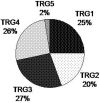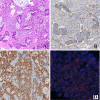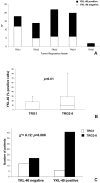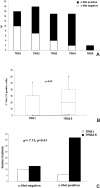YKL-40/c-Met expression in rectal cancer biopsies predicts tumor regression following neoadjuvant chemoradiotherapy: a multi-institutional study
- PMID: 25875173
- PMCID: PMC4398550
- DOI: 10.1371/journal.pone.0123759
YKL-40/c-Met expression in rectal cancer biopsies predicts tumor regression following neoadjuvant chemoradiotherapy: a multi-institutional study
Abstract
Background: Neoadjuvant chemo-radiotherapy (CRT) followed by surgical resection is the standard treatment for locally advanced rectal cancer, although complete tumor pathological regression is achieved in only up to 30% of cases. A clinicopathological and molecular predictive stratification of patients with advanced rectal cancer is still lacking. Here, c-Met and YKL-40 have been studied as putative predictors of CRT response in rectal cancer, due to their reported involvement in chemoradioresistance in various solid tumors.
Material and methods: A multicentric study was designed to assess the role of c-Met and YKL-40 expression in predicting chemoradioresistance and to correlate clinical and pathological features with CRT response. Immunohistochemistry and fluorescent in situ hybridization for c-Met were performed on 81 rectal cancer biopsies from patients with locally advanced rectal adenocarcinoma. All patients underwent standard (50.4 gy in 28 fractions + concurrent capecitabine 825 mg/m2) neoadjuvant CRT or the XELOXART protocol. CRT response was documented on surgical resection specimens and recorded as tumor regression grade (TRG) according to the Mandard criteria.
Results: A significant correlation between c-Met and YKL-40 expression was observed (R = 0.43). The expressions of c-Met and YKL-40 were both significantly associated with a lack of complete response (86% and 87% of c-Met and YKL-40 positive cases, p< 0.01 and p = 0.006, respectively). Thirty of the 32 biopsies co-expressing both markers had partial or absent tumor response (TRG 2-5), strengthening their positive predictive value (94%). The exclusive predictive role of YKL-40 and c-Met was confirmed using a multivariate analysis (p = 0.004 and p = 0.007 for YKL-40 and c-Met, respectively). TRG was the sole morphological parameter associated with poor outcome.
Conclusion: c-Met and YKL-40 expression is a reliable predictor of partial/absent response to neoadjuvant CRT in rectal cancer. Targeted therapy protocols could take advantage of prior evaluations of c-MET and YKL-40 expression levels to increase therapeutic efficacy.
Conflict of interest statement
Figures





References
-
- Frykholm GJ, Pahlman L, Glimelius B. Combined chemo- and radiotherapy vs. radiotherapy alone in the treatment of primary, nonresectable adenocarcinoma of the rectum. Int J Radiat Oncol Biol Phys. 2001;50: 427–434 - PubMed
-
- Bosset JF, Collette L, Calais G, Mineur L, Maingon P, Radosevic-Jelic L, et al. Chemotherapy with preoperative radiotherapy in rectal cancer. N Engl J Med. 2006;355: 1114–1123 - PubMed
-
- Janjan NA, Khoo VS, Abbruzzese J, Pazdur R, Dubrow R, Cleary KR, et al. Tumor downstaging and sphincter preservation with preoperative chemoradiation in locally advanced rectal cancer: the M. D. Anderson Cancer Center experience. Int J Radiat Oncol Biol Phys. 1999;44: 1027–1038 - PubMed
Publication types
MeSH terms
Substances
LinkOut - more resources
Full Text Sources
Other Literature Sources
Research Materials
Miscellaneous

